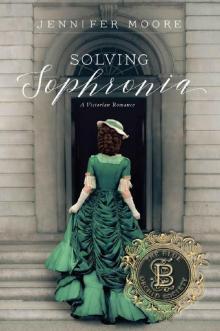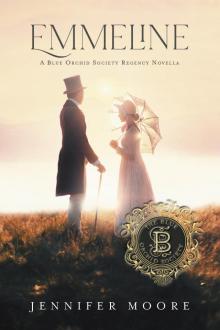- Home
- Jennifer Moore
My Dearest Enemy
My Dearest Enemy Read online
Cover images: Lady in White Vintage Dress © Irina Alexandrovna, Shutter Stock. Silouettes in Cannon Smoke © Allkindza, iStockphotography. Cover design by Christina Marcano © 2018 by Covenant Communications, Inc.
Cover design © 2018 by Covenant Communications, Inc.
Published by Covenant Communications, Inc.
American Fork, Utah
Copyright © 2018 by Jennifer Moore
All rights reserved. No part of this book may be reproduced in any format or in any medium without the written permission of the publisher, Covenant Communications, Inc., P.O. Box 416, American Fork, UT 84003. The views expressed within this work are the sole responsibility of the author and do not necessarily reflect the position of Covenant Communications, Inc., or any other entity.
This is a work of fiction. The characters, names, incidents, places, and dialogue are either products of the author’s imagination, and are not to be construed as real, or are used fictitiously.
First Printing: April 2018
ISBN: 978-1-52440-578-6
For Wayne and Eileen.
I love your son and being part of your family.
With you, I won the in-law jackpot.
Acknowledgments
I am so grateful for all the people who helped me with this book.
Of course, Frank and my boys are my support system. They listen to my plot ideas, tiptoe around when I’m reading and writing, and endure hours of war documentaries. I’m the luckiest person in the world to have a family like mine.
Thank you to Laurie Lewis for your fabulous Free Men and Dreamers series. It inspired me, taught me, and touched my heart. I’m so glad we’ve become friends.
I’m grateful for my girls, Nancy Allen and Josi Kilpack, who helped me with this plot and encouraged me when I was nervous about switching from British history. You two are my anchors.
Thank you, Michelle Shaw, for sharing your pictures of winter in Detroit. Your kids are adorable.
I’m so grateful for a mother, Penny Lunt, who loves history and genealogy. She found an ancestor who fought at Frenchtown, Private William Tidwell. Knowing this battle is part of my personal history gave me a connection to the story and made it all the more special.
And of course, my dad, Ed Lunt, for the countless rock-hunting trips and for buying me my own little pickaxe so we could find fossils. Thanks for answering my questions about mineral compounds and geological phenomena. Your collection of rocks and bones and minerals and gems is a fixture of my childhood, and I loved including that bit of you in this story.
Thank you to the team at Covenant. Kami Hancock, for your sharp editing eye—thanks for smoothing out the rough edges. Thanks, Christina Marcano, for the beautiful cover.
Chapter 1
“Blast the United States of America.” Abigail Tidwell spoke in a loud voice, feeling very self-satisfied at the echo the words produced in the empty woodbox. She smiled smugly and almost laughed imagining her father’s or Isaac’s reaction to her vulgarity, but thanks to the cursed United States of America, they were both away. And Abigail was left to manage the house alone. Including the outside chores.
Slamming down the lid, she huffed out a breath, though no one was around to see how inconvenienced she was, then wrapped a cloak around her shoulders and slipped through the door, bracing herself against the onslaught of frigid wind that blew the cold straight through layers of clothing, skin, and muscle, directly into her bones. Even after placing the last log onto the fire, she'd waited before going out to the woodshed to replenish the supply by the hearth, hoping the storm would end. But it hadn't let up all day, and if she delayed much longer, the fire would burn out completely, leaving her house cold and dark for the entire night.
She pulled her cloak tighter, noting how, in just a few seconds, the blowing snow had already nearly covered the blue wool in white flakes. Her cheeks stung from the cold. She trudged out toward the woodshed feeling put out. Neither her older brother nor her father would ever have let the woodbox become empty. But there was nothing for it now. If only James Madison hadn’t declared war on Great Britain, then she and the rest of Upper Canada would not have to worry about brothers and fathers leaving home, gunships filling the Great Lakes, and battalions of troops marching through peaceful towns.
The American president was so far away in Washington City, and yet the war seemed so close to Abigail. Close enough that last summer, she’d heard the cannon blasts all the way across the river as the battle raged in Detroit. Luckily the British Army had taken the city and put a stop to the Americans’ violence. And even more luckily, His Majesty’s soldiers at Fort Detroit and Fort Malden had the services of the very best physician-surgeon in all of the empire: Abigail’s father, Dr. William Tidwell.
Another burst of snowy wind nearly bowled her over, and Abigail thought of a few choice phrases she’d learned from Isaac and his military companions. Phrases she knew they would have been aghast to realize a young lady had overheard, but which seemed to perfectly fit as a description for the blue-coated enemy on the other side of the border. If not for the cursed Americans, Isaac—Major Isaac Tidwell, if one was to be particular—would be able to visit his family home on the outskirts of Amherstburg, Ontario, more often, instead of being assigned to train soldiers, guard prisoners, plan defenses, and endless matters of war-type business required for a man of his rank.
Abigail hadn’t received a letter from Isaac in nearly a month. The true reason for the delay was merely winter. Ships couldn’t sail over the frozen Lake Erie, and instead, letters and visiting brothers had to travel slowly and unreliably over the snow-covered land. Though she knew the truth, she found it much more gratifying to blame President Madison and his ridiculous declaration of war for all her inconveniences.
Though it cost his life, General Brock’s well-trained British soldiers had already averted one American attack at Queenston Heights on the Niagara. It serves those Americans right for trying to invade Upper Canada. With any luck, they won’t try again.
Abigail rounded the corner of the house, pulling her cloak even tighter against the wind. Although the chopped wood was kept in a small shed conveniently located beside the kitchen entrance, she couldn’t open the kitchen door without brushing away the heap of snow blocking it. The snow had blown into high drifts against the east side of the house, and so instead of walking close to the outer wall and using it as a protection from the wind, she took a longer path, leaving her more exposed to the elements. And she grumbled the entire time.
The snow was deeper than it had been this morning when she’d gone out to the barn to feed and milk Maggie. She was glad her father and Isaac had patched up loose boards last summer and mended the leaking roof. Maggie’s pen would be warm and snug and the feed dry.
Abigail glanced toward the barn then stopped. She looked more closely, squinting through flurries. But even in the waning daylight she could see the door was ajar. Surely she’d fastened it this morning. A coldness that had nothing to do with the weather clutched her heart. Had someone gone into the barn?
She turned and hurried back into the house, closing the door behind her and leaning against it. Of course it would be foolish for a young woman to investigate alone. No neighbors lived close enough for her to easily call on for help, especially not in this storm. The wisest course would be to wait until tomorrow when Mr. Kirby came by to fetch her milk and butter on his way into town. But she could hardly leave Maggie at the mercy of a thief or a wolf, or—she shuddered—a deserter. And what if she had simply forgotten to fasten the latch and raised an alarm for nothing?
Pulling her father’s musket from the chimney pegs above the mantle, she opened the small box where he kept the lead balls and powder. Father had insisted she learn to
handle the weapon, and Abigail had practiced loading and shooting numerous times. She was proud of her skill with the weapon that many would consider too heavy for her to even lift, but today her hands were shaking. Would she have to fire it at a person to protect her family’s property?
She opened the door and reached for a lantern, hooking it over her arm and carrying it unlit as she stepped outside. She did not wish to give a possible intruder the advantage of remaining hidden in the shadows while illuminating herself.
She hardly noticed the chill or the wind as she approached the barn. Studying the ground outside, she saw no visible footprints, but if any had existed the wind would have erased them in any case. Her heart thumped as she clenched the weapon tightly and pushed open the barn door.
Peeking inside, she could see only shadows in the gloom. Maggie lowed from her pen in the far corner, likely displeased with the admittance of cold air. Looking toward the other side of the building, Abigail could see the outline of the wagon and the empty pen where Father stabled his horse, Magnus.
She stood still, listening for any other sound, but aside from the wind whistling outside and the whisper of a stray gust blowing straw over the ground, she heard nothing. But something wasn’t right. She stood still, studying the inside of the barn as the obscure detail danced on the edge of her thoughts, just out of reach.
After a long moment, she recognized what was amiss. Blood. She smelled blood.
Abigail stepped back outside and lit the lantern, wishing she did not have to set down the musket in order to do so. Her hands were fumbling, and she feared someone might approach from behind while she’d set down the musket. What would she find when the interior of the barn was illuminated?
She held the lantern high and still managed to carry the musket—which was much heavier with one hand. Stepping quietly, she moved over the hard-packed dirt floor, and there, in the flickering halo of light, she saw him.
Abigail’s first impulse was to run and barricade herself inside the house. But she stood frozen, fear stealing her ability to move. While she stared at the figure lying on the ground, two realizations occurred to her at the same time. First of all, the man was not moving, and based on the puddle of blood beneath him and the arrow sticking out of his side, he was injured very badly, if not dead. Secondly, and this realization was a matter of much graver concern: the man in her barn wore an American soldier’s uniform.
Terror made her mouth taste like she’d licked a rusty nail. All of Abigail’s muscles were clenched tight, and her mind first emptied then filled with a barrage of questions. None of which she knew the answer to. Where had the man come from? Was he alone? Was he a person meaning to do harm? He lay on his side as if he’d collapsed, blood covering his hands and clothes. Was it all his own?
She set the lantern on the ground and prodded his arm with the tip of the musket, but he did not move. Holding the weapon steadily aimed at him, she slid the lantern forward with her foot to get a better look and saw the rise and fall of his chest. He was alive then. But he did not shiver in his wet clothing, which was not a good sign, and blood continued to seep from his side. Though he was yet alive, he wouldn’t remain so for long. She poked him again, this time harder, not trusting that he wasn’t simply feigning insentience while waiting for her to move closer.
Her poke pushed him over so he rolled onto his back. The man made a noise so soft that it was less a groan than a sigh. The sound did something funny to Abigail’s heart. A spot inside her grew warm, melting away some of the fear and opening a space that was filled by a swell of compassion. Though he was an enemy, he was still a man––someone’s son, or perhaps a father. And Abigail was first and foremost a healer. And besides, she couldn’t very well allow a cursed American to die in her barn, could she?
She lifted a coil of rope from a peg on the wall and tied one end around the soldier’s wrist then threaded it through the spokes of a wagon wheel. Continuing along the side of the wagon, she threaded the rope though another wheel and tied it to the man’s other wrist, quite proud of herself for the ingenious idea. Now, even if he did wake, he wouldn’t be able to grab her while she worked on his wounds. And his hands were separated far enough so he couldn’t untie himself, but he could still lie relatively comfortably on the ground.
She rushed back through the dark and returned with blankets, a bucket of water, and her small medical bag. The man still hadn’t moved. In the flickering light, she could see he possessed strong cheekbones, and though his face was pale, it was well proportioned with a square jaw. If he wasn’t a cursed American, he might be considered handsome. Now that he was bound, he seemed less menacing, and the feeling of compassion grew and with it, an urgency.
She removed the shako hat and felt his head. No fever. Well, that was good, although his skin was extremely cold. She checked the ends of his fingers, relieved to find no sign of frostbite, then turned her attention to the heavy woolen coat, trying to decide exactly how to remove it. It was wet and wouldn’t slide off easily, and she’d already bound his wrists. The arrow had pierced straight through the wool, and she feared fibers would be inside the wound. But she imagined the thick material would have slowed the arrow down, possibly kept it from going too deep into the man’s body. She decided she’d have to cut it off. Using scissors, she cut carefully around the arrow then cut along the length of the sleeves to pull out his arms, and finally drew the coat free, noticing the golden epaulets on the shoulders. She didn’t imagine the captain would be pleased when he saw what had become of his uniform, but perhaps she could mend it later.
Next, she cut off his shirt, noticing it was made from soft cotton instead of the thicker homespun she was used to. A fine garment, but decidedly impractical for winter in Upper Canada. The man’s chest and arms were muscled, his shoulders broad, and for some reason, this made Abigail blush. She was glad he was unconscious as she pulled away the shirt. She focused on her inspection. Aside from his arrow wound, he’d been cut on his upper arm. The wounds were clean. No swelling or discoloration on the torn flesh.
Abigail wasn’t certain whether the soldier had fallen unconscious from the pain of his injuries or possibly exposure to the elements or even loss of blood. Perhaps a combination of all three.
She set to work, glad he wasn’t awake to feel when she expanded his wound with a scalpel to extract the arrowhead. She moved the lantern close and checked the opening thoroughly to make sure no fibers or dirt had entered with the arrow then poured water over the wound. When she was satisfied that it was clean, she threaded the curved needle and sutured the lacerations closed. She used a mortar and pestle to crush herbs into a paste then wrapped thin cotton around the mixture to make a poultice that would hopefully keep away swelling and pain and draw out any infection. Holding the bundle against the wound, she tied bandages around the soldier’s middle to keep it in place. Then she repeated the process with the wound on his arm. Luckily it was much shallower.
Abigail worked well into the night, hardly noticing the cold, doing everything in her power to ensure the soldier’s survival. Once she was finished, she sat back, pushing away a lock of hair that had fallen over her forehead. So much was still uncertain. Would his body warm up? How much blood had he lost? Would his wounds become inflamed? Would he even awake? She’d done all she could; whether he healed or not was now up to him.
Chapter 2
Emmett woke and was immediately struck by a flash of pain so strong that he gasped. He forced open his eyes, but his vision blurred, so he let them drift closed again. His head felt heavy, like it had been packed too full. And the pain. A burning flared in his side, just below his ribs, as if a searing iron was probing into him. He shifted, intending to touch the spot, but when he moved one arm down, the other lifted, stretching his side painfully. He groaned.
Water sated his parched throat, but he couldn’t see where it had come from. He thought he heard kind words spoken in a woman’s gentle voice, but that was obviously impossible. He must have fe
ver madness. Time passed and he vacillated just on the edge of sleep, unable to force his mind to focus enough to fully wake.
An unknown amount of time passed, and finally, he felt a semblance of coherence. Cracking his eyes open, he saw he was in a dimly lit building with no furniture—a shed or a barn perhaps. The sound of a cow somewhere nearby made the second conjecture seem the most likely. He tried to move his arm again with the same result as before. What the devil? Turning his head inch by agonizing inch, he saw his wrists were bound. Though on an intellectual level he knew it would only cause more pain, his panic won out, and he pulled at the ropes, sending agony to his injuries. The knots were tight. His heart started pounding, and he tried to force his sluggish brain to make sense of what was happening to him.
His last memories were foggy. He was leading a company on a reconnaissance mission, hoping to gain information about Fort Malden’s supply line for General Winchester. The regiment’s trek north through Michigan Territory had been fraught with peril. The roads were nearly impassible, one day a swamp and the next, ice. Supplies were so far behind that the troops were in danger of starvation, and typhus fever spread through the camp, leaving three hundred men on the sick list at a time; an average of four daily died from the malady. And all this was in addition to the typical camp difficulties, such as blisters, leg sores, impetigo, and lice.
Emmett remembered crossing the frozen Detroit River with his small company and observing the fort from the woods, but something had happened . . . He tried to push through the murkiness, and suddenly the memory returned with sharp clarity. The Indian attack! Emmett jolted, trying to sit upright, but immediately wished he hadn’t when the pain magnified and lights burst behind his eyes. What had happened to the men in his command? Were they injured as well? Captured? He must find out.
His burst of alarm exhausted him, and he lay his head back down . . . on a pillow? What kind of Indians wrapped their prisoners in quilts and provided feather pillows? His curiosity was overcoming the initial panic, and he tolerated the ache of moving his head again in order to have a better look at his surroundings. Nearby, he saw his hat and boots. And his uniform coat hung from a peg on the wall, the sleeve’s gold decorations signifying his rank standing out against the dark-blue wool. What had happened to his gear? Had he lost his pack in the attack? As he became more aware, he felt that he was wearing a tight cap on his head, and on his hands—

 Charlotte's Promise
Charlotte's Promise Miss Leslie's Secret
Miss Leslie's Secret My Dearest Enemy
My Dearest Enemy A Week in Brighton (Timeless Regency Collection Book 13)
A Week in Brighton (Timeless Regency Collection Book 13) Solving Sophronia (The Blue Orchid Society, #1)
Solving Sophronia (The Blue Orchid Society, #1) Spring in Hyde Park
Spring in Hyde Park Emmeline
Emmeline Wrong Train to Paris (Romance on the Orient Express, #2)
Wrong Train to Paris (Romance on the Orient Express, #2) Wrong Train to Paris
Wrong Train to Paris Miss Burton Unmasks a Prince
Miss Burton Unmasks a Prince Safe Harbor
Safe Harbor The Sheik's Ruby
The Sheik's Ruby Change of Heart
Change of Heart Lady Helen Finds Her Song
Lady Helen Finds Her Song Simply Anna
Simply Anna